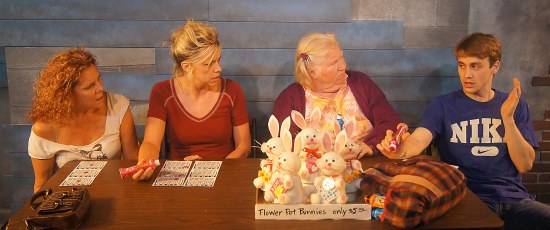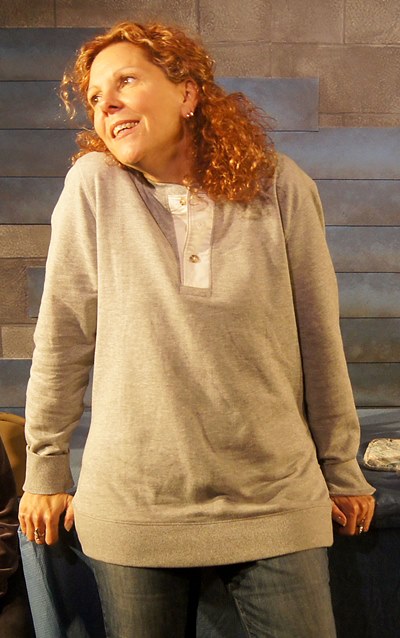‘Good People’ at Redtwist: Down on her luck, Boston Southie seeks hope behind lace facade
 Review: “Good People” by David Lindsay-Abaire, at Redtwist Theatre, extended through Aug. 23. ★★★★
Review: “Good People” by David Lindsay-Abaire, at Redtwist Theatre, extended through Aug. 23. ★★★★
By Lawrence B. Johnson
Margie’s life is hard, like the “g” in her name. It’s all she’s ever known. She grew up in the rough-and-tumble projects of Boston’s south side – a real “Southie.” She doesn’t have much, but at least she has a job; well, had a job. As we look in on Margie’s lot in David Lindsay-Abaire’s “Good People,” now staged with potent intimacy at Redtwist Theatre, she’s about to be fired.
That will leave her with two things: a half-grown, mentally undeveloped child, and desperation. It’s her search for a break that filters Margie’s friends and acquaintances, once and current, and proves one or another worthy of her highest esteem, as good people.
 It’s a noble encomium, good people – bestowed not just selectively, but upon one person at a time: “Oh, yeah, I know that guy. He’s good people.”
It’s a noble encomium, good people – bestowed not just selectively, but upon one person at a time: “Oh, yeah, I know that guy. He’s good people.”
Lindsay-Abaire’s play gets right down to the grit of real life, which means it’s fraught with as much irony as despair, as much laughter as pain and a distinct imbalance between wealth and the happiness not always within its purchase.
Jacqueline Grandt is magnetic as rough-edged, scrappy, scraping Margie, who ekes out the monthly rent to pay her friend Dottie (the dryly riotous Kathleen Ruhl) and gets a steady earful of advice from pal Jean (practical, direct and empathic KC Karen Hill). She has one other close acquaintance, Stevie (Aaron Kirby in a charmingly earnest turn), whose late mother was part of this Southie circle. They’re all bingo buddies, which raises some question about whether Stevie is gay? Nah, he says. He just enjoys bingo.
It’s Stevie, a genuinely sweet young man and Margie’s boss at the dollar store, who fires her – for being habitually late. He didn’t want to let her go, but when the store’s owners reviewed the constantly late punches on her time cards, they demanded that Stevie get rid of her.
Margie has trotted out the usual explanation. She can’t leave her daughter alone and sometimes the sitter is late or doesn’t show up at all. What’s she supposed to do? But it won’t happen again, she promises (again). Stevie is sorry, but the owners insist. Margie is gone.
 Her frantic scramble for a job catapults her into the upper-crust (or “lace-curtain” in her Boston Irish patois) world of an old high school sweetheart, Mike (Mark Pracht), who escaped the projects to become a doctor. When Margie barges into Mike’s office, his awkward greeting and a bit of reminiscing about the old days give way to some testy exchanges about his new lace-curtain life. The tension escalates to a fine edge between Grandt and Pacht as the doc tries to underplay his success and Margie needles him like an acupuncturist.
Her frantic scramble for a job catapults her into the upper-crust (or “lace-curtain” in her Boston Irish patois) world of an old high school sweetheart, Mike (Mark Pracht), who escaped the projects to become a doctor. When Margie barges into Mike’s office, his awkward greeting and a bit of reminiscing about the old days give way to some testy exchanges about his new lace-curtain life. The tension escalates to a fine edge between Grandt and Pacht as the doc tries to underplay his success and Margie needles him like an acupuncturist.
When Mike mentions that he and his wife are throwing a party in a few days, Margie invites herself, thinking one of his well-heeled friends might have a job for her. On the day of the party, however, Mike calls to let Margie know it’s been canceled because his child is ill. She thinks she’s getting blown off, and resolves to go anyway.
Eric Luchen’s set design, minimal in the slickest sense, instantly whisks us from South Boston to the high-rent district. In both settings, director Matt Hawkins’ fluid pacing allows the energy of both comedy and drama to ebb and flow with the rhythm and power of tidal waves.
 But now, as Margie rings the bell at Mike’s beautiful home in this alien world, the play gets down to muscle, bone and sinew – and the viewer, virtually within arm’s length of the actors in Redtwist’s jewel of a space, can feel the rasp, drill and chisel of bitter confrontation.
But now, as Margie rings the bell at Mike’s beautiful home in this alien world, the play gets down to muscle, bone and sinew – and the viewer, virtually within arm’s length of the actors in Redtwist’s jewel of a space, can feel the rasp, drill and chisel of bitter confrontation.
Mike and his elegant black wife Kate (Kiki Layne) are struggling to keep their marriage together; indeed, they are seeing a counselor. Kate eagerly, and perhaps a touch spitefully, prevails upon Margie to fill in the blanks of Mike’s youth, and in much the same ambivalent spirit of eagerness and spite, Margie recalls those halcyon days, not omitting her sweet season with Kate’s present husband.
Thus does the gate swing open to a battleground reminiscent of the breath-catching rawness of “God of Carnage.” Layne, a young actress only a year out of DePaul’s theater program, is a persuasive sophisticate who holds the line of civility as the two Southies in the room go at it hammer and tongs. It’s funny and appalling at the same time, and as Grandt’s plain-spoken Margie exits, it is indeed carnage that she leaves in her wake.
There is a sort of epilogue, back at the bingo game where Margie’s luck, with a little push, takes a turn for the better. It’s a winning number, under the G – as in good people.
Related Links:
- Performance location, dates and times: Go to TheatreinChicago.com
- Previously reviewed at Redtwist Theatre: Go to ChicagoOntheAisle.com
- Frances McDormand won the 2011 Tony Award for her portrayal of Margie on Broadway: See her acceptance speech
Tags: Aaron Kirby, David Lindsay-Abaire, Eric Luchen, Jacqueline Grandt, Kathleen Ruhl, KC Karen Hill, Kiki Layne, Mark Pracht, Matt Hawkins, Redtwist Theatre

